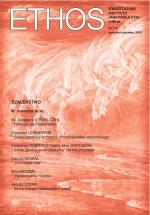 zobacz powiększenie | DOI 10.12887/28-2015-2-110-04 Fr. Dariusz DZIADOSZ – The Madness of Saul: Insanity, Possession or a Political Plot? Cena brutto: 7,00 PLN za szt. |
|
The motif of madness certainly does not belong among the leading themes of the Hebrew Bible. The Old Testament texts approach the question of madness and insanity with great caution, as if the inspired authors realized the complexity of the phenomena in question and were aware of their supernatural origin. The Bible usually speaks negatively about madness, attributing this term to human behaviors and attitudes which are described today as psychological, emotional, and depressive disorders, as well as spiritual ones, such as being possessed. Every instance of a disturbed balance of mind or personality is seen in the Bible as a result of the working of the hand of God, who has decided to influence the life of a particular individual for reasons he only knows. The tragic story of Saul, the first king of Israel, provides a perfect illustration of this theological truth despite its being presented in many different ways by different historical-Biblical sources. The present article describes selected social, political, literary and theological aspects of the Biblical personality of the son of Kish, as seen from the perspective of his apparent madness, his being rejected and his final suicide. Translated by Dorota Chabrajska Keywords: madness in the Bible, Saul, David, First Book of Samuel, madness, the spirit of YAHWEH Contact: Department of Exegesis of Historical and Didactic Books of the Old Testament, Institute of Biblical Studies, Faculty of Theology, John Paul II Catholic University of Lublin, E-mail: dariuszdzi@op.pl http://www.kul.pl/ks-dr-hab-dariusz-dziadosz,art_446.html Pliki do pobrania: » 110_Dziadosz.pdf | |
